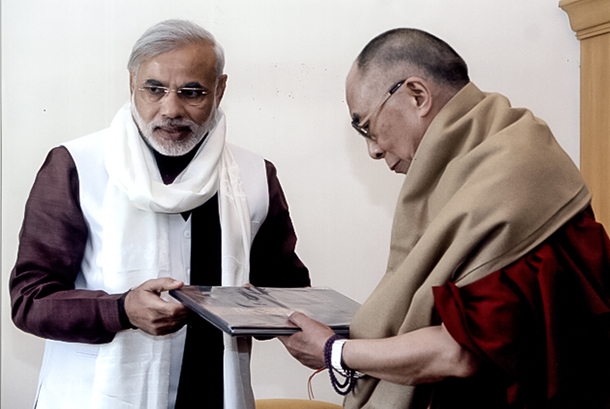 Dharamshala — Senior Congress leader and Vice Chairman of Himachal Pradesh Tourism Development Board, Vijai Singh Mankotia on Thursday backed former Union minister and BJP MP from Kangra, Shanta Kumar for conferring the Bharat Ratna on the spiritual leader of Tibet, His Holiness the Dalai Lama.
Dharamshala — Senior Congress leader and Vice Chairman of Himachal Pradesh Tourism Development Board, Vijai Singh Mankotia on Thursday backed former Union minister and BJP MP from Kangra, Shanta Kumar for conferring the Bharat Ratna on the spiritual leader of Tibet, His Holiness the Dalai Lama.
All party Parliamentary members' forum on Tibet too has passed a resolution to this effect stating that by preaching peace across globe, saying His Holiness Dalai Lama has contributed in strengthening the ancient Indian values and traditions in the world.
Shanta Kumar, who is also the president of forum, said that after his exile from Tibet, Dalai Lama was settled in Dharamshala from where he preached peace to entire world, Indian media reported.
He said that earlier too highest award of country has been conferred to two non-Indians- Khan Abdul Gaffar Khan and Nelson Mandela.
Congress leader and Himachal Pradesh Tourism Development Board vice-chairman Major Vijay Singh Mankotia has supported the demand of Shanta Kumar, the report added.
Mankotia said that Dalai Lama is residing in Dharamshala ever since he fled from Tibet, approximately 56 years ago after the blatant occupation of his country by China.
"I and countless others, the silent majority, fully endorse this demand and we hope the Prime Minister and the government at India will take morally correct step to honour this, perhaps, the greatest apostle of peace of modern times," he added.
He said Dalai Lama has inspired millions of people across the world to shun violence, show compassion, tolerance and understanding. Having been honoured in 1989 with the Nobel Peace prize this spiritual leader has reaffirmed that India alone can show light to this world which is torn by violence, terrorism, jehad and fundamentalism, he said.
In last month, the Tibet Support Group of Arunachal Pradesh has also appealed to the Centre to confer the prestigious Bharat Ratna award on His Holiness the Dalai Lama for his 'services to India and humanity'.
The Tibetan leader describes himself as a Son of India, firstly because my thoughts come from the Nalanda Buddhist tradition and his body has lived on Indian dal, rice and chapattis during the last 50 years. "So, physically also, I am a Son of India."
His Holiness often tells Indian audiences: "I consider Indians as my gurus, because we follow the Nalanda tradition. All our concepts and way of thinking comes from the Nalanda Masters. Therefore, we are the chelas and Indians are our gurus."
Tibet was invaded by Communist China in 1949. Since that time over 1.2 million out of 6 million Tibetans have been killed, over 6000 monasteries have been destroyed— acts of murder, rape and arbitrary imprisonment, torture and cruel, inhuman and degrading treatment were inflicted on the Tibetans inside Tibet, Beijing calls a "peaceful liberation".
In 1959, His Holiness the 14th Dalai Lama along with thousands of others escaped to India, where he was given political asylum. The spiritual leader has set up a government and rebuilt monasteries where masters pass on their teachings to young monks. Tibetans in exile have succeeded in gradually rebuilding their monasteries, preserving their culture and restructuring their society and keeping it alive, in spite of the extremely difficult circumstances.
For his part, the Tibetan spiritual leader travels around the world spreading a message of Peace and Universal Responsibility. He believes that the common aim of all religions, an aim that everyone must try to find, is to foster tolerance, altruism and love. He retired from politics in 2011. But, as one among six million Tibetans, His Holiness said he will continue to serve the cause of Tibet.
The Tibetan leader seeks genuine autonomy for the Tibetan people within the scope of the Constitution of the PRC through Middle Way Approach. But Beijing's Communist regime views the spiritual leader as an agitator and has repeatedly rejected calls for autonomy for his homeland of Tibet.


![Tibet has a rich history as a sovereign nation until the 1950s when it was invaded by China. [Photo: File]](/images/stories/Pics-2024/March/Tibet-Nation-1940s.jpg#joomlaImage://local-images/stories/Pics-2024/March/Tibet-Nation-1940s.jpg?width=1489&height=878)















